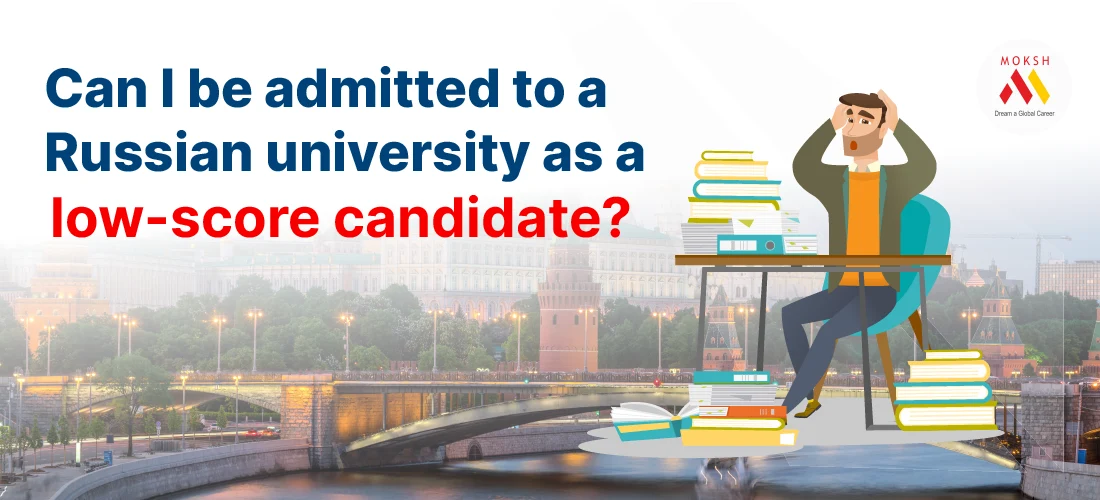
For many students, studying abroad is a dream. The chance to immerse yourself in a new culture, gain international experience, and earn a globally recognised degree is incredibly appealing.
- But what if your academic record isn't perfect?
- What if your scores aren't at the top of the class?
- Fear not, aspiring international students!
Here's some good news: Russia might be your ideal study-abroad destination, even with lower scores.This blog delves into the eligibility criteria, admission process, and key factors to consider for pursuing an MBBS in Russia if you haven't scored exceptionally high in NEET.
Can Low-Scoring Students Get Admission to Russia?
The answer is yes, with a qualification. Unlike Indian medical colleges, most Russian universities don't require a high NEET score for admission. However, there are minimum eligibility requirements:
- Minimum Marks in PCB (Physics, Chemistry, Biology):
- Students belonging to the General category must score 50% marks in PCB (Physics, Chemistry & Biology) in their 12th standard exams.
- Students with ST/SC/OBC must score 45% overall in Physics, Chemistry, and Biology in their 12th standard.
- Passing Marks in NEET: While a high score isn't mandatory, qualifying for NEET is essential. The NEET cutoff for 2024-25 will be announced on June 14th.

Admission Process for Low Scorers
Here's a simplified breakdown of the admission process for students with lower NEET scores:
- Research Universities: Identify universities that offer MBBS programs in English and consider factors like tuition fees, accreditation, hostel facilities, and past student experiences. Be aware of frauds study abroad consultancy they might offering you Russian program.
- Prepare Documents: Collect necessary documents of 10th and 12th standard mark sheets, NEET scorecard, passport, and medical certificates. Translation and apostille (verification) of documents might be required.
- Apply Online: Download the MOKSH Career Planner app, select your university, and complete the application form. (Read all the instructions carefully.) Make sure to apply before the university's deadline.
- Interview (if applicable): Some universities might schedule online interviews to assess your communication skills.
- Visa Application: Once accepted, obtain a student visa for Russia.
Advantages of MBBS in Russia for Low Scorers
- Lower NEET Score Requirement: Compared to Indian medical colleges, the pressure to score exceptionally high in NEET is significantly reduced.
- Affordable Education: Medical education in Russia is generally less expensive than in other Western countries. Universities offer tuition fee structures that cater to international students.
- Globally Recognised Degree: Universities offering MBBS programs are recognised by MCI and other international bodies, allowing you to practice medicine after clearing the Foreign Medical Graduate Examination (FMGE) upon your return to India.
- Focus on Practical Training: Many Russian universities emphasise practical training alongside theoretical knowledge, providing valuable hands-on experience.
Challenges to Consider
- Language Barrier: Adapting to a new language and culture can be challenging, as you don't have any prior knowledge of Russian.
- Climate: Russia has a colder climate compared to India. Be prepared to adjust to harsher winters.
- Distance from Home: Studying abroad involves being away from family and friends. Building a strong support network among fellow students can help.
Universities with Low Score Admission
- Orel State Medical University
- Bashkir State Medical University
- Kabardino Balkarian State University
- Kazan Federal University
- Orel State Medical University
- Bashkir State Medical University
- Kabardino Balkarian State University
- Crimean Federal University
- Kemerovo State Medical University
- Rostov State Medical University
- Siberian State Medical University
- Peoples Friendship University
Russia Awaits!
Studying abroad can be an unbelievable experience, and Russia offers a unique culture, rich history, and high-quality education. With some research and a proactive approach, even low scores don't have to be a barrier. So, start exploring your options, reach out to universities, and get ready for your Russian adventure!
Conclusion
While securing admission to a Russian university with low scores may present challenges, it's certainly achievable with careful planning, dedication, and perseverance. By leveraging alternative admission criteria, showcasing your strengths, and demonstrating your potential, you can increase your chances of realising your academic aspirations in Russia.
Remember, every candidate is unique, and universities value diversity and talent in their student body. So, don't be discouraged by past setbacks—instead, focus on presenting the best version of yourself to admissions committees. You can turn your academic dreams into reality with determination and strategic effort, even as a low-scoring candidate.






.webp)
